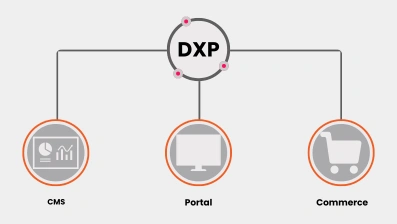Digital experience is one of the most important concepts in today’s time.
But what is it?
That’s the question a lot of new and changing businesses are asking themselves. Well, we have all the answer you need.
In this blog, we shall be discussing all you need to know about digital experience and why it’s important for you business.
Enough said, let’s get right into it:
What is Digital Experience?
In the dynamic realm of the digital landscape, the term "digital experience" encompasses the entirety of interactions and engagements a user has with a brand across various digital touchpoints.
It’s the holistic perception that users form based on their interactions with a company’s digital assets, including websites, mobile apps, social media platforms, emails, and more.
At its core, digital experience management revolves around ensuring that every interaction a user has with a brand is seamless, intuitive, and engaging. It’s about crafting experiences that not only meet but exceed user expectations, leaving a lasting impression and fostering brand loyalty.
Imagine a user navigating through a website to find information about a product or service.
The ease with which they find what they’re looking for, the clarity of the information presented, and the overall aesthetic appeal of the website all contribute to their digital experience.
Similarly, interactions on social media platforms, such as engaging with posts or messaging a brand, also shape the user’s perception.
Digital customer journey plays a pivotal role in defining digital experience.
It encompasses the series of touchpoints and interactions a user goes through while engaging with a brand online, from the initial discovery phase to post-purchase support.
Understanding and optimizing this journey is crucial for delivering a cohesive and impactful digital experience.
The Customer Journey & Touchpoints
The customer journey maps out the various interactions a customer has with your brand, from the moment they become aware of your existence to well after they've made a purchase.
Understanding these touchpoints is crucial for crafting a positive digital experience (DX) that keeps them engaged and coming back for more.
Here's a breakdown of some key touchpoints along the customer journey, along with how a strong DX can elevate the experience:
Awareness Stage
- Search Engines: Potential customers might discover your brand through organic search results or paid advertising. A strong DX ensures your website is optimized for search engines (SEO) and landing pages are clear and informative, converting those clicks into website visitors.
- Social Media: Customers may encounter your brand on social media platforms through organic posts, influencer marketing, or targeted ads. A strong DX involves engaging content and responsive social media management, fostering brand awareness and positive online sentiment.
Consideration Stage
- Website: Your website is often the central hub of the customer journey.A strong
DX means a user-friendly website with clear navigation, valuable content, and product information that convinces potential customers your brand is the right choice.
- Mobile App: In today's mobile-first world, a well-designed app can significantly enhance the customer experience.A strong DX translates to a user-friendly and functional mobile app that allows for easy browsing, product research, and even purchases – all on the go.
Decision Stage
- Online Reviews: Many customers rely on online reviews before making a purchase decision. A strong DX involves actively managing your online reputation by encouraging positive reviews and addressing negative feedback promptly.
- Customer Service Interactions: Pre-purchase customer service interactions can make or break a sale. A strong DX ensures prompt and helpful customer service via various channels (live chat, email, phone) to answer questions and address concerns.
Purchase Stage
- Ecommerce Platform: A smooth and secure checkout process is essential for converting website visitors into paying customers. A strong DX means a user-friendly shopping cart, secure payment gateways, and multiple payment options to provide a seamless purchasing experience.
Post-Purchase Stage
- Email Marketing: Targeted email campaigns can nurture customer relationships, promote new products and services, and encourage repeat purchases. A strong DX involves personalized email marketing that provides value and keeps your brand top-of-mind with customers.
- Customer Loyalty Programs: Rewarding loyal customers can encourage repeat business and positive word-of-mouth marketing. A strong DX involves integrating loyalty programs with your digital experience, making it easy for customers to participate and reap the benefits.
Remember, a strong DX goes beyond just having a website.
It's about creating a cohesive and positive experience across all touchpoints, fostering customer trust and loyalty at every stage of the journey.
DXPs (Digital Experience Platforms) like Kentico can be instrumental in achieving this by providing the tools and functionalities to manage content, personalize experiences, and unify your customer journey across all digital channels.
Benefits of a Strong Digital Experience
Ever wondered why so many companies are investing in digital experience platforms? Well, it’s because DX is important.
Not to mention, it also has a lot of benefits.
Let’s see why:
Competitive Differentiation
In a saturated digital landscape, a strong digital experienceserves as a powerful differentiator.
By delivering best digital experiencesthat surpass competitors, businesses can carve out a unique identity and attract a loyal customer base.
This differentiation not only boosts brand visibilitybut also strengthens market position, enabling businesses to command premium pricing and drive sustainable growth.
Enhanced Trust and Credibility
Trust is the cornerstone of any successful business relationship, and a strong digital experience plays a pivotal role in fostering it.
When users encounter seamless, intuitive interfaces and engaging content, they perceive the brand as reliable and trustworthy.
This trust translates into increased conversions, higher customer retention rates, and positive word-of-mouth referrals, laying the foundation for long-term success.
Human-Centric Approach
In an increasingly digital world, maintaining a human touch is essential for building meaningful connections with customers.
A strong digital experience strategy embraces this human-centric approach by delivering personalized content, tailored recommendations, and responsive customer support.
By treating each interaction as an opportunity to engage and delight users, businesses can forge deeper connections, instill brand loyalty, and differentiate themselves from competitors.
Adaptability to Consumer Trends
Consumer preferences and behaviors are constantly evolving, driven by technological advancements, cultural shifts, and market dynamics.
A strong digital experience strategy enables businesses to stay agile and responsive to these changes, ensuring that their digital presence remains relevant and compelling.
By continuously monitoring and analyzing consumer trends, businesses can adapt their digital experiences to meet evolving expectations, seize new opportunities, and stay ahead of the curve.
Improved Customer Satisfaction
At the heart of every successful business lies a commitment to customer satisfaction.
A strong digital experience strategy prioritizes user needs and preferences, striving to deliver seamless, intuitive, and enjoyable interactions at every touchpoint.
By removing friction points, optimizing user journeys, and providing timely support, businesses can enhance customer satisfaction, foster loyalty, and drive positive outcomes.
Increased Engagement
Engagement is the lifeblood of any digital strategy, driving interactions, conversions, and brand advocacy.
A strong digital experience captivates users, encouraging them to explore, interact, and connect with the brand on a deeper level.
Whether through compelling content, immersive experiences, or interactive features, businesses can inspire greater engagement, longer sessions, and stronger emotional connections, ultimately driving business success.
Sustainable Growth
Ultimately, the benefits of a strong digital experience extend beyond immediate gains to drive sustained growth and profitability.
By investing in digital experience management, businesses can cultivate a loyal customer base, generate repeat business, and unlock new revenue streams.
Moreover, by differentiating themselves in the market and fostering strong brand advocacy, businesses can build resilience against market fluctuations and competitive pressures.
Thus, ensuring long-term viability and success.
Consequences of a Poor Digital Experience
In contrast to the benefits of a strong digital experience, overlooking its importance can have detrimental consequences for businesses.
A poor digital experience can alienate customers, damage brand reputation, and hinder growth prospects.
Let’s delve into the repercussions of neglecting digital experience management:
Dissatisfied Customers
When users encounter difficulties navigating websites, apps, or other digital platforms, frustration ensues.
A clunky user interface, slow loading times, or confusing navigation can leave users dissatisfied and reluctant to engage further with the brand.
Loss of Trust and Credibility
Consistently subpar digital experiences erode trust and credibility in the brand.
Users may perceive a lack of attention to detail or an indifference to their needs, leading them to question the reliability and authenticity of the brand.
Decreased Customer Loyalty
A poor digital experience undermines customer loyalty and retention efforts.
Users are more likely to switch to competitors if they encounter smoother, more satisfying experiences elsewhere. This churn can result in lost revenue and diminished market share.
Negative Word-of-Mouth
Unhappy customers are vocal about their experiences, both online and offline.
Negative reviews, social media complaints, and word-of-mouth referrals can tarnish a brand's reputation and deter potential customers from engaging with the business.
Missed Opportunities for Conversion
Friction points in the digital journey inhibit conversion opportunities.
Whether it's a cumbersome checkout process, unclear product information, or unresponsive customer support, each hurdle increases the likelihood of abandoned carts and lost sales.
Inability to Adapt to Changing Trends
A rigid digital infrastructure incapable of adapting to evolving consumer trends and technological advancements puts businesses at a disadvantage.
Failure to innovate and meet user expectations can result in stagnation and irrelevance in the market.
Long-Term Business Impacts
The repercussions of a poor digital experience extend beyond immediate setbacks, impacting long-term business viability.
Diminished brand reputation, reduced customer loyalty, and missed opportunities for growth can hinder profitability and sustainability.
Building a Strong Digital Experience With DXPs
Digital experience platform is all the rage!
In the quest for digital excellence, organizations turn to Digital Experience Platforms (DXPs) as indispensable tools for orchestrating seamless and engaging digital experiences.
DXPs serve as the backbone of a comprehensive digital strategy, empowering businesses to deliver personalized, omnichannel experiences that captivate users and drive results.
Here's how DXPs contribute to building a strong digital experience:
Unified Customer View
DXPs consolidate customer data from various sources, providing a unified view of each user's preferences, behaviors, and interactions across channels.
This holistic understanding enables businesses to deliver personalized experiences tailored to individual needs and preferences.
Content Management and Personalization
DXPs offer robust content management capabilities, allowing businesses to create, manage, and distribute content across multiple channels seamlessly.
Advanced personalization features enable dynamic content delivery based on user profiles, behaviors, and contextual factors, ensuring relevance and engagement.
Omnichannel Engagement
DXPs facilitate omnichannel engagement by enabling consistent messaging and experiences across all digital touchpoints, including websites, mobile apps, social media, email, and more.
This unified approach ensures a cohesive brand experience regardless of the channel or device used by the user.
Customer Journey Orchestration
DXPs empower businesses to orchestrate the entire customer journey, from discovery to conversion and beyond.
By mapping out user journeys, identifying touchpoints, and automating interactions, businesses can guide users seamlessly through the sales funnel, driving conversions and maximizing lifetime value.
Data-driven Insights and Analytics
DXPs provide comprehensive analytics and reporting capabilities, allowing businesses to track user engagement, measure performance, and derive actionable insights.
By analyzing data from various touchpoints, businesses can optimize digital experiences, identify trends, and make data-driven decisions to enhance ROI.
Integration Capabilities
DXPs seamlessly integrate with existing systems and third-party applications, enabling businesses to leverage existing infrastructure and technologies.
Whether it's CRM systems, e-commerce platforms, or marketing automation tools, DXPs facilitate seamless data exchange and collaboration, streamlining operations and maximizing efficiency.
Scalability and Flexibility
DXPs are designed to scale with the evolving needs of businesses, supporting growth and expansion without compromising performance.
Whether it's handling increased traffic, launching new digital initiatives, or adapting to changing market dynamics, DXPs offer the flexibility and scalability to meet evolving business requirements.
Here’s To Help You
DotStark as a leading Kentico development company, understands the critical role that digital experience plays in shaping business success.
Our team of experts specializes in crafting bespoke solutions tailored to your unique needs, helping you navigate the complexities of digital experience management and unlock new opportunities for growth.
With our expertise and your vision, together, we can elevate your digital presence and deliver exceptional experiences that resonate with your audience.
Conclusion
In the digital age, the importance of a strong digital experience cannot be overstated. It serves as the cornerstone of success for businesses, shaping customer perceptions, driving engagement, and fostering long-term loyalty. By prioritizing digital experience management and leveraging the capabilities of Digital Experience Platforms (DXPs), businesses can deliver personalized, omnichannel experiences that captivate users and drive results.
From competitive differentiation to enhanced trust and credibility, the benefits of a strong digital experience are manifold. Conversely, neglecting digital experience can have detrimental consequences, including dissatisfied customers, diminished brand reputation, and missed opportunities for growth. Therefore, investing in digital experience is not just an option but a necessity for businesses looking to thrive in today's digital-first landscape.
Frequently Asked Questions
Digital Experience Management encompasses the strategies, processes, and technologies used to optimize user interactions with digital assets, such as websites, mobile apps, and social media platforms, to deliver seamless and engaging experiences.
DXPs provide a comprehensive suite of tools and capabilities for orchestrating personalized, omnichannel experiences across all digital touchpoints. From content management to customer journey orchestration, DXPs empower businesses to deliver exceptional digital experiences.
Neglecting digital experience can lead to dissatisfied customers, diminished brand reputation, and missed opportunities for growth. Poor digital experiences can alienate users, erode trust, and ultimately, impact business performance.
Businesses can improve their digital experience by prioritizing user needs and preferences, optimizing digital touchpoints, leveraging data-driven insights, and investing in technologies such as Digital Experience Platforms (DXPs) to deliver personalized, omnichannel experiences.
Digital experience is important for businesses because it shapes customer perceptions, drives engagement, and fosters long-term loyalty. In today's digital-first landscape, businesses that prioritize digital experience are better positioned to differentiate themselves, drive growth, and stay ahead of the competition.











 +91 9680599916
+91 9680599916
 vanshika@dotstark.com
vanshika@dotstark.com
